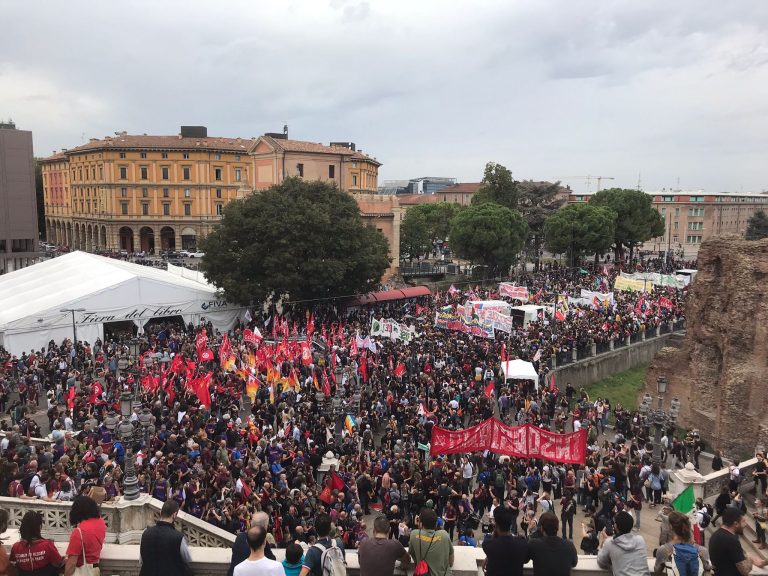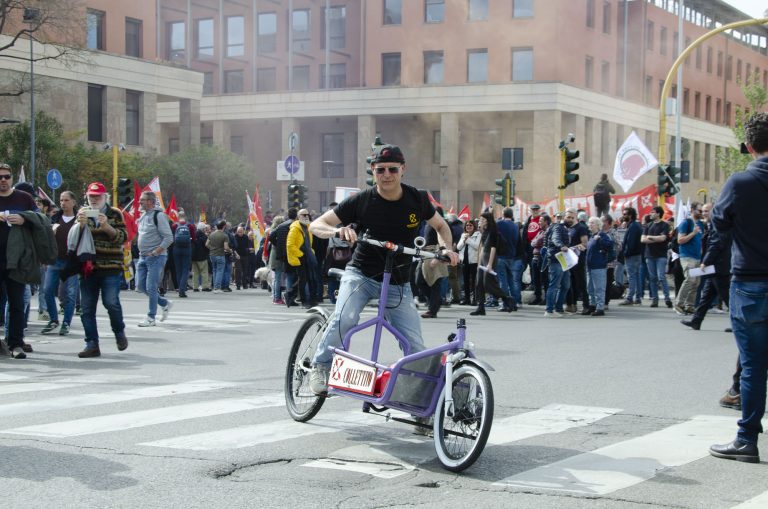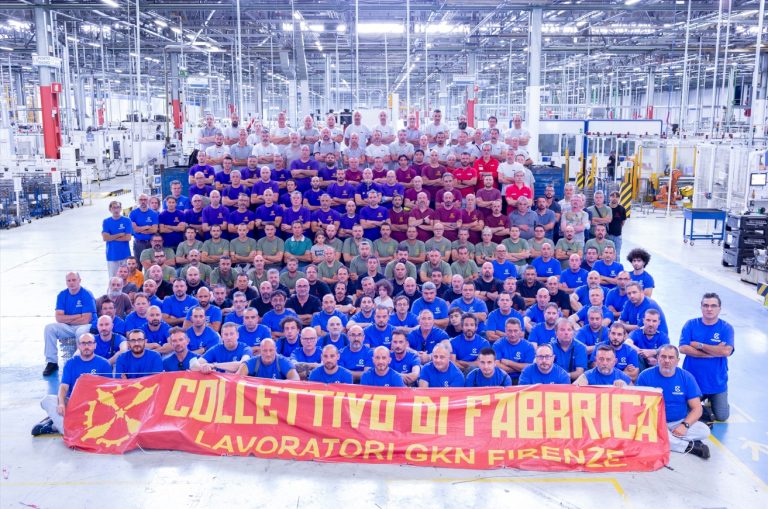Ecological conversion now! The occupied GKN factory near Florence

For more than two years now, workers at the former GKN car parts factory in Florence have been occupying the plant to prevent its closure – the longest time in the history of factory occupation in italy.
What happened?
On July 9, 2021, workers at the Campi Bisenzio site (Florence) were informed by email of the immediate closure of the plant and the loss of their jobs. 422 workers lost their jobs from one day to the next. The investment company Melrose Industries had bought the plant in 2018. The closure of the plant followed the company’s profit logic. In order to optimize the value chain, the site in Campi Bisenzio, which was considered less profitable, was to be abandoned and production outsourced to Eastern Europe.
The workforce’s reaction to the closure was not long in coming. In previous disputes, the company collective had already carried out networking work and organized resistance against wage cuts and redundancies. When the news of the factory closure reached the colleagues, the decision to occupy the plant together was an obvious one. An ‘indefinite works assembly’ was set up with the majority of the dismissed workers to discuss the situation. This meeting has been ongoing since it began on July 9, 2021. The plant is still at a standstill.
The actions of Melrose Industries

The actions of companies like Melrose Industries are well known and have far-reaching consequences. Entire regions fall victim to financialization and are de-industrialized by the closure of important factories. In the countries where the factories are put back into operation, the cycle starts all over again and people and nature are exploited for as long as state regulations allow or until the sources of wealth dry up.
In Campi Bisenzio, the closure of the factory would not only mean the loss of jobs and a disruption in the individual lives of the workers. The closure would result in the massive impoverishment of people in the entire community. Around 500 families living in Campi Bisenzio, but also in Prato and other neighboring communities, for example, are directly affected by the factory closure.
What next?

It is therefore not surprising that the squatters have received widespread support throughout the region. Up to 40,000 people took part in the demonstrations organized by the collective following the plant’s closure. The workers received particular support from the climate movement, which ultimately inspired them to develop an alternative production plan.
After the closure, it was initially unclear what would happen next. The workers no longer wanted to produce axle shafts for cars. In the debate about restarting the plant, various representatives from the climate movement and civil society were consulted, climate camps were visited and support groups were founded. Scientists at the University of Pisa drew up a reindustrialization plan for Campi Bisenzio. The factory agreed to produce cargo bikes and solar panels in the future, for which the first prototypes have already been developed over the past two years.
The workers want to continue organizing the conversion of the factory on their own and have therefore founded a cooperative. They need one million euros to found the cooperative and buy the factory. The money for this will come from donations and the sale of cooperative shares, which can be purchased via their website.
Why is this project so important?

Lighthouse projects such as the conversion of the former GKN factory are important markers for us in designing a better future. They show us how practical solidarity among colleagues, together with the climate movement, can initiate groundbreaking changes. It is clear to us that with the right pressure, it is possible in principle to build an economy from below organized according to ecological and scientific standards and that the social issue of preserving jobs does not contradict the interests of the climate movement – rather, these issues must be considered together. They also remind us that, in the face of the climate catastrophe, it is not enough to limit our individual consumption. We need to look at the economy as a whole, join forces and start to shape it consciously.
Just like at GKN, conversion plans could be drawn up for each sector of the economy using the skills of employees and with the support of students and academics from different fields. In this way, the outlines of a production that meets people’s needs and at the same time respects planetary boundaries could be sketched out.
We show our solidarity with the workers’ fight to save their jobs and for a climate-neutral future.
For the conversion of factories!
For a life without bosses!
For a future worth living!
For further information follow these links:
https://www.instagram.com/insorgiamo.de/
http://insorgiamo.org/germany/
https://insorgiamo.org/100×10-000/
